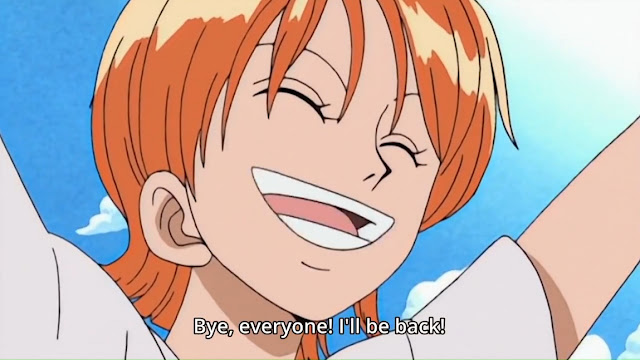After losing to the psionic type Pokémon of the Yamabuki City Gym Leader, Natsume; Satoshi set out to capture a spectral Pokémon at Shion Town’s Pokémon Tower in order to challenge Natsume again. However, since the Pokémon Tower is rather creepy, Takeshi and Kasumi refuse to accompany Satoshi into the tower for ta second time. When Satoshi asked themどうしたの二人とも。(Dou shita no futari tomo), which means “what’s the matter, the both of you”; Kasumi repliedいってらっしゃい (Itterasshai).
 |
| What's wrong, you two? |
いってらっしゃい mean please go and come back. It is usually exchanged withいってきます (Ittekimasu), which mean I will go and come back. This exchange happens when somebody is leaving a place for a period of time, and there’s also somebody remaining at that place.
So, when leaving home, one should say いってきます (Ittekimasu) if he/she is returning, and the person staying behind will say いってらっしゃい (Itterasshai).
Althoughさようなら (sayounara) is the better-known word for goodbye, but this expression is only used when the person saying it do not expect or not sure when he/she will meet the other person again. 失礼します (Shitsureishimasu), which can mean excuse me; sorry to interrupt; or, sorry, I will leave first. So, 失礼します (Shitsureishimasu) can be used when going to the toilet, or leaving work before others.
 |
| Ja ne |
Therefore, the goodbye and see you in the Japanese language should be used appropriately according to the duration of the leave. When saying “see you” to your friend, just sayじゃあね (Ja ne) orまたね (Mata ne).
二人 or ふたり (futari) is the word for two people or a couple. For one person or alone, it is一人 or ひとり (hitori). For the rest, just add人 or にん (nin) to the number like 三人 (san nin) for three people or 四人 (shinin) for four people.
Be sure to use the correct expression.
Japanese
|
Romaji
|
English
|
どうしたの
|
Dou shita no
|
What’s the matter?
|
二人とも
|
Futari tomo
|
Both of you
|
いってきます
|
Ittekimasu
|
I will go and come back
|
いってらっしゃい
|
Itterasshai
|
Please go and come back
|
ただいま
|
Tadaima
|
I’m home
|
おかえり
|
Okaeri
|
Welcome back
|
さようなら
|
Sayounara
|
Do not expect or not sure when he/she will meet the other person again
|
失礼します
|
Shitsureishimasu
|
Excuse me; sorry to interrupt; or, sorry, I will leave first.
|
じゃあね
|
Ja ne
|
See you then
|
またね
|
Mata ne
|
See you
|
Kanji
|
Hiragana
|
Romaji
|
English
|
一人
|
ひとり
|
Hitori
|
Alone, one person
|
二人
|
ふたり
|
Futari
|
Two people, couple
|
三人
|
さんにん
|
San nin
|
Three people
|
四人
|
しにん
|
Shinin
|
Four people
|
Till then, じゃあね。
No comments:
Post a Comment